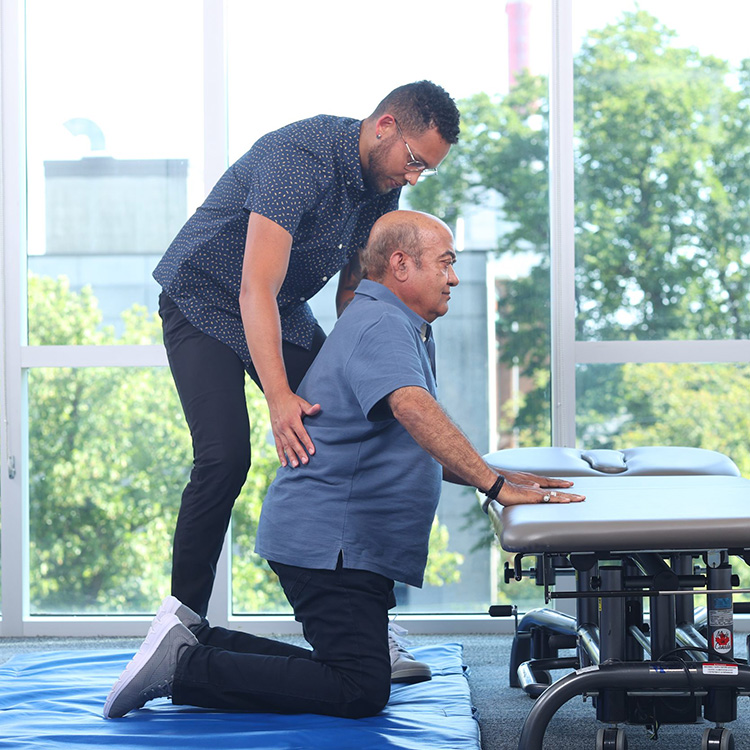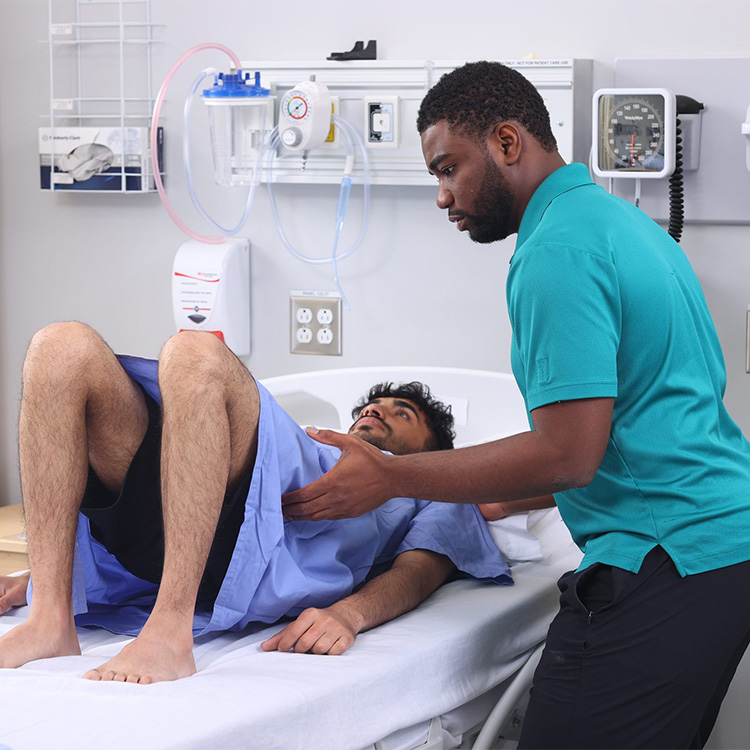En améliorant l’accès aux soins de physiothérapie et en optimisant et uniformisant le champ de pratique au pays, on pourrait alléger les pressions sur le système de santé

Les provinces et territoires du Canada doivent absolument travailler de concert pour permettre aux physiothérapeutes d’exercer pleinement leurs compétences
Leur aide améliorerait l’accessibilité, l’efficacité et la qualité des soins, et profiterait au système de santé et à la population dans son ensemble
Autonomie dans la prescription d’examens d’imagerie diagnostique.
(radiographies, échographies, IRM)
Autonomie dans l’orientation des patients en médecine spécialisée
(neurologie,
chirurgie orthopédique, etc.)
Standardiser les capacités de diagnostic et de traitement de la santé pelvienne pour tous les physiothérapeutes
Veuillez noter que la publication en français du rapport est retardée car, après examen, nos partenaires francophones du comité de direction et de l'AQP ont fourni des commentaires critiques qui doivent être pris en compte pour garantir l'exactitude du langage technique contenu dans le rapport. Nous nous excusons pour ce retard et affirmons notre engagement à faire en sorte que les rapports de l'ACP reflètent la diversité linguistique du Canada tout en garantissant l'intégrité et l'impact des informations et des données présentées. Alors que nous donnons la priorité à l'achèvement de ces rapports, l'ACP remercie ses partenaires de l'AQP pour leur leadership au cours de ces examens et à l'avenir, alors que nous mettons en place un processus visant à assurer une publication multilingue, simultanément.

En consultation avec des professionnels de la physiothérapie et des leaders de la profession au Canada, l’ACP a défini le Champ de practique national et précisé les activités et les compétences exercées par les physiothérapeutes au pays.

Préparée par Deloitte Consulting pour l’ACP, cette étude s’intéresse aux données cliniques sur la rentabilité des traitements de physiothérapie ainsi qu’à leur effet sur le fardeau de la maladie. Elle estime leurs retombées potentielles sur les résultats cliniques et évalue les avantages d’un meilleur accès aux physiothérapeutes pour le traitement de trois affections : l’ostéoarthrite, les lombalgies et les coronaropathies.

À venir

Adresse postale
955 Green Valley Crescent, Suite 270
Ottawa, Ontario
K2C 3V4
Téléphone
Courrier électronique
© 2024 Association canadienne de physiothérapie
| Footnotes: | ||||
1. Per the College of Physical Therapists of British Columbia, 16 February 2024: Professional regulation is undergoing significant change both in terms of the introduction of the new Health Professions and Occupations Act (“HPOA”), which is not yet in force, and the scheduled amalgamation of several of the colleges under the Health Professions Act in June 2024. https://cptbc.org/2024/02/16/faqs-on-proposed-physical-therapists-regulation-amendments/ The College of Physical Therapists of BC will amalgamate with the other six colleges to form the College of Health and Care Professionals of BC on June 28, 2024. Until then, the College of Physical Therapists of BC and the other six colleges will continue to regulate health professionals. https://cptbc.org/2024/02/29/ministry-of-health-confirms-name-of-new-multi-profession-college/ | ||||
2. Jurisdiction does not have a defined or described scope of practice for physiotherapy. Physiotherapists working in this jurisdiction are required hold an active licence from another jurisdiction. Individual physiotherapist scope of practice may vary depending upon respective legislations. | ||||
| 3. Jurisdiction does not have a defined or described scope of practice for physiotherapy. Physiotherapists working in this jurisdiction are required hold an active licence from another jurisdiction. Individual physiotherapist scope of practice may vary depending upon respective legislations. | ||||
| 4. All legislation has passed, all proclaimed, all pending a change to a regulation for implementation. in interim can perform through delegation or standing order. The regulation change needed is an amendment to the Exemptions Section of Regulation 107/93 under the RHPA (MRI and Ultrasound for diagnostic purposes are referenced in the Regulation as per the Interpretation Section) via the addition of “a member of the College of Physiotherapists of Ontario” for purposes of MRIs and diagnostic ultrasound. | ||||
| 5. Physiotherapists employed by Nova Scotia Health or IWK Health can already request X-rays, but starting in early spring (2024), physiotherapists working in private practice will also be able to request X-rays. They must be in good standing with the Nova Scotia College of Physiotherapists to request an X-ray. | ||||
| 6. All legislation has passed, all proclaimed, all pending a change to a regulation for implementation. in interim can perform through delegation or standing order. The regulation change needed is an amendment to the Exemptions Section of Regulation 107/93 under the RHPA (MRI and Ultrasound for diagnostic purposes are referenced in the Regulation as per the Interpretation Section) via the addition of “a member of the College of Physiotherapists of Ontario” for purposes of MRIs and diagnostic ultrasound. | ||||
| 7. All legislation has passed, all proclaimed, all pending a change to a regulation for implementation. in interim can perform through delegation or standing order. The regulation change needed is an amendment to the Exemptions Section of Regulation 107/93 under the RHPA (MRI and Ultrasound for diagnostic purposes are referenced in the Regulation as per the Interpretation Section) via the addition of “a member of the College of Physiotherapists of Ontario” for purposes of MRIs and diagnostic ultrasound. | ||||
| 8. No laws require amendment. All that remains are changes to two regulations: the first under the Laboratory and Specimen Collection Centre Licensing Act amendments are required to sections 17 and 18 of Regulation 45/27 (that replaced Regulation 682) under that Act to enable “a member of the College of Physiotherapists of Ontario” to collect specimens for and requisition laboratory tests. Second an amendment is required to section 12 of Regulation 207/94 under the Medical Laboratory Technology Act to include “a member of the College of Physiotherapists of Ontario” as a “prescribed person” in order to satisfy the requirements of subsection 5. (1) of the Act. interim can be performed through delegation or standing order | ||||
| 9. Recommendation and application only | ||||
| 10. Practice of Physiotherapy includes (j) administration of physical therapy-related medications as prescribed by a physician or a nurse licensed to practice as a nurse practitioner in the jurisdiction where the nurse practices nursing, | ||||
| 11. Practice of Physiotherapy includes (j) administration of physical therapy-related medications as prescribed by a physician or a nurse licensed to practice as a nurse practitioner in the jurisdiction where the nurse practices nursing, | ||||
| 12. Practice of Physiotherapy includes (j) administration of physical therapy-related medications as prescribed by a physician or a nurse licensed to practice as a nurse practitioner in the jurisdiction where the nurse practices nursing, |